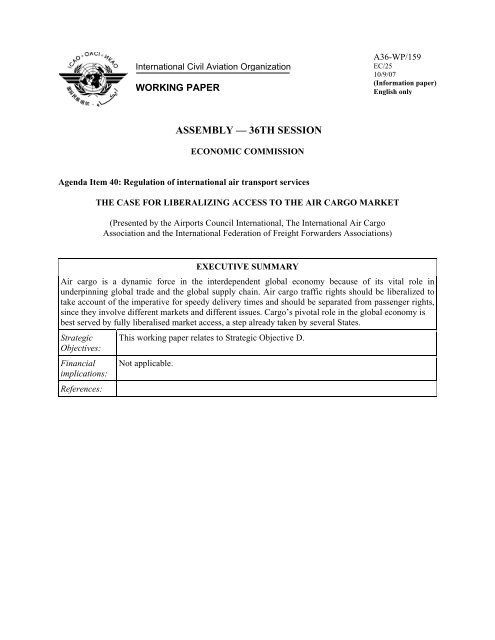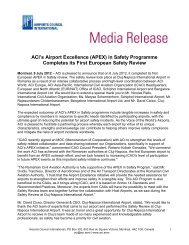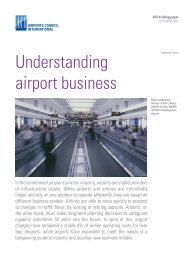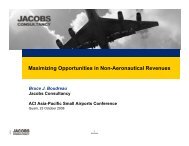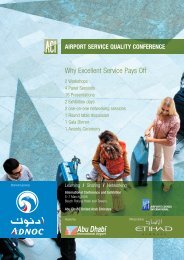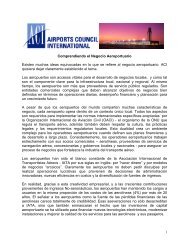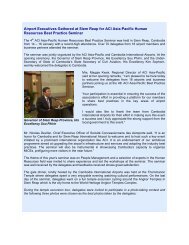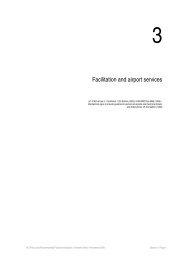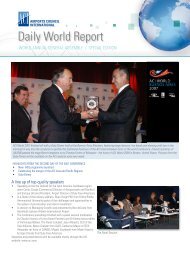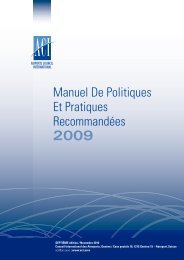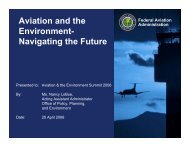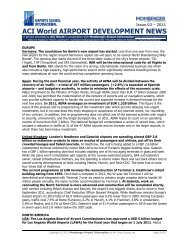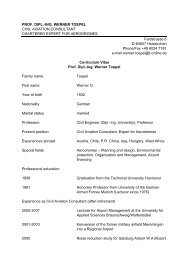ASSEMBLY â 36TH SESSION - ICAO
ASSEMBLY â 36TH SESSION - ICAO
ASSEMBLY â 36TH SESSION - ICAO
Create successful ePaper yourself
Turn your PDF publications into a flip-book with our unique Google optimized e-Paper software.
International Civil Aviation Organization<br />
WORKING PAPER<br />
A36-WP/159<br />
EC/25<br />
10/9/07<br />
(Information paper)<br />
English only<br />
<strong>ASSEMBLY</strong> — <strong>36TH</strong> <strong>SESSION</strong><br />
ECONOMIC COMMISSION<br />
Agenda Item 40: Regulation of international air transport services<br />
THE CASE FOR LIBERALIZING ACCESS TO THE AIR CARGO MARKET<br />
(Presented by the Airports Council International, The International Air Cargo<br />
Association and the International Federation of Freight Forwarders Associations)<br />
EXECUTIVE SUMMARY<br />
Air cargo is a dynamic force in the interdependent global economy because of its vital role in<br />
underpinning global trade and the global supply chain. Air cargo traffic rights should be liberalized to<br />
take account of the imperative for speedy delivery times and should be separated from passenger rights,<br />
since they involve different markets and different issues. Cargo’s pivotal role in the global economy is<br />
best served by fully liberalised market access, a step already taken by several States.<br />
Strategic<br />
Objectives:<br />
Financial<br />
implications:<br />
References:<br />
This working paper relates to Strategic Objective D.<br />
Not applicable.
A36-WP/159<br />
EC/25<br />
- 2 -<br />
1. INTRODUCTION<br />
1.1 ACI, FIATA and TIACA support the liberalization of air cargo and express services for<br />
unfettered market access. The three organisations strongly believe that the global air cargo marketplace<br />
should be unrestricted as to the ability of air carriers to move cargo in any international market between<br />
two points anywhere in the world.<br />
1.2 The three organisations are in favour of liberalizing international traffic rights for all air<br />
charter, combination carriers and all-cargo carriers, and allowing buyers and users the opportunity and<br />
responsibility to determine their carrier of choice in the marketplace. Setting air cargo free in this way<br />
allows market mechanisms to work across economies for the benefit of global trade.<br />
1.3 The present state and pace of air cargo liberalization denies users, industry participants,<br />
and States the benefits of full global trade. The framers of the Chicago Convention could not have<br />
conceived of the fundamental importance of air cargo today for so many users and consumers around the<br />
globe.<br />
2. BACKGROUND<br />
2.1 As is evident from the following section titled “The Economic Impact of the Air Cargo<br />
Industry”, air cargo and express transportation is an economic development tool and driver of economic<br />
growth for the global economy; where liberalized all-cargo transportation traffic rights are available,<br />
separate all-cargo agreements should be pursued as the first step towards market liberalization and<br />
openness. Often developing countries see the advantages of market openness for the movement of goods<br />
before they recognize the same advantages on the passenger side. Such openness should be balanced and<br />
should be enhanced strictly for economic reasons.<br />
2.2 Where efforts to separate all-cargo operating rights from combination rights, including<br />
passenger service, are deemed to be more practical, such agreements should not be held back by<br />
restrictions brought about by countries in an effort to protect carriers’ ambitions on the passenger side.<br />
2.3 Cargo liberalization entails a shift in current regulation by proposing an agreement<br />
between like-minded countries that support the principle of severance of cargo from passenger rights, as<br />
an initial step in a long term strategy. Under this approach, a new generic all-cargo agreement would<br />
grant the same rights and privileges, on a reciprocal basis, to all signatories.<br />
2.4 Such liberalization for all-cargo rights, however, should in no way restrict the ability of<br />
combination carriers to obtain similar agreement rights for both passenger and cargo service. There are<br />
circumstances where, politically, the granting of such all-cargo rights must be taken in parallel with<br />
combination carrier openness. It is understood that there is the possible need to exclude cabotage from<br />
this particular instrument. The establishment of a multilateral group of countries permitting fifth, sixth,<br />
and seventh freedoms can be confidently expected from countries that already operate “Open Skies”<br />
agreements.
- 3 -<br />
A36-WP/159<br />
EC/25<br />
2.5 The following organizations subscribe to and approve the above proposal to liberalize air<br />
cargo traffic rights:<br />
• International Federation of Freight Forwarders’ Associations<br />
• The International Air Cargo Association<br />
• Airports Council International<br />
3. THE ECONOMIC IMPACT OF THE AIR CARGO<br />
INDUSTRY<br />
3.1 A number of studies have been undertaken in recent years on the economic impact of the<br />
air cargo industry. These studies unanimously confirm the growing importance of air cargo in the<br />
increasingly interdependent world economy, particularly cargo’s role in facilitating efficient movement of<br />
intermediate, and high value goods among nations to bring efficiency and cost savings in the production<br />
process. For example, a cell phone designed in the UK might contain parts made in Canada, the U.S. and<br />
Sweden and be assembled in China for eventual sale by a Finnish company. This division of labour is far<br />
from random. High value operations are performed in nations with superior R and D, whereas labourintensive<br />
assembly is performed in developing countries with lower wages, but sufficiently skilled work<br />
forces 1 . The rapid movement by air of components of the cell phone in this scenario also match supply to<br />
demand, essential to minimize heavy inventory costs.<br />
3.2 Quantifying the economic impact of air cargo is at best an imprecise science. Bearing this<br />
in mind, the following sections discuss economic impact in terms of employment and income effects and<br />
also introduce the concept of the opportunity cost of disruptions in the cargo logistics supply chain.<br />
4. AIR CARGO AS A CATALYST FOR EMPLOYMENT<br />
4.1 Studies by Airports Council International over the past several years have quantified the<br />
number of employees at airport sites owing their jobs to air cargo operations. Taking a figure of 4.5<br />
million employees at airports worldwide, ACI surveys determined that about 15% of these jobs were<br />
directly related to air cargo operations giving a total of nearly 700,000 jobs in the cargo sector. But this is<br />
only a small part of total jobs dependent on air cargo in trucking, warehousing, freight-forwarding and<br />
sorting operations which are performed off-airport. Given the fact that airport real estate is often<br />
constrained and thus very expensive, many operations in the cargo logistics chain are located long<br />
distances from the air transport hub. An example would be Tokyo’s Narita International Airport where<br />
cargo operations are consolidated at a site over 50 kilometres from the airport.<br />
4.2 Case studies help us quantify the economic benefits of air cargo for a city or region. In<br />
Anchorage, Alaska, for example, about 10 percent of jobs in the city are directly related to operations at<br />
the airport, which is a huge hub for the sorting and re-directing trans-Pacific cargo. Indeed three<br />
companies, FEDEX, UPS and DHL operate in over 200 countries and employ over 950,000 employees<br />
collectively. The gusto with which cities compete to be selected as hubs for the cargo express market, as<br />
was the case with the six cities in the Carolinas area of the USA short-listed for a new FedEx sorting<br />
facility, is in and of itself a strong indicator of the value attached to air cargo-induced economic growth.<br />
1<br />
Example provided by Webber and Maynard: Global Cargo Trends 2006
A36-WP/159<br />
EC/25<br />
- 4 -<br />
5. FINANCIAL IMPLICATIONS<br />
5.1 There are widely varying estimates of the financial impact of the air cargo industry. Most<br />
analysts quote a figure of 30% to 40% as the amount of world trade that moves by air in value terms.<br />
Using the range this puts the value of all shipments carried by air at between US$ 2.5 and 3.5 trillion, by<br />
any measure an impressive number. As more and more nations join the World Trade Organization, tariffs<br />
will decline and more goods will move by air. Almost all forecasters see at least 6 percent annual global<br />
growth for air cargo tonnage over the next 20 years.<br />
5.2 It would not be inaccurate to portray global air cargo as an economic powerhouse. The<br />
large integrators have investment grade credit ratings in an airline industry otherwise beset with highly<br />
volatile share prices and historically low returns for shareholders.<br />
5.3 Another way to look at the cargo logistics chain is in terms of opportunity costs. With the<br />
logistics chain putting a premium on so-called “time-definite” services, restrictive bilateral and<br />
multilateral air services agreements impose a high cost on carriers, the shipper and the eventual customer.<br />
Outmoded bilateral agreements, which always have treated air cargo market access as a subset of<br />
passenger traffic, slow the logistics supply chain or cause the chain to operate over circuitous routings,<br />
adding precious time to the shipping process.<br />
5.4 Only a few countries (India the most prominent) have embraced the logic that all-cargo<br />
services should be treated separately from passenger traffic and have moved to create liberalized regimes<br />
for cargo, including in some cases unilateral rights for seventh freedom traffic.<br />
5.5 Those countries which have made the move to electronic pre-clearance and paperless<br />
processing of shipments are at a competitive advantage in a business where time is money.<br />
6. CONCLUSION<br />
6.1 The air cargo industry is already enabling the rapid integration of the world economy,<br />
bringing efficiencies to complex production processes by moving intermediate goods to regions which<br />
add the highest value at the lowest cost. Air cargo also carries high value finished goods quickly from<br />
manufacturer to consumer, cutting inventory costs and driving high levels of customer satisfaction. The<br />
future of the industry depends to a large extent on governments recognizing that market forces should<br />
continue to drive innovation. Excessive regulation has a high cost, creating inefficiencies in the global<br />
supply chain and thereby reducing the positive economic impact of air cargo on the economy.<br />
— END —


